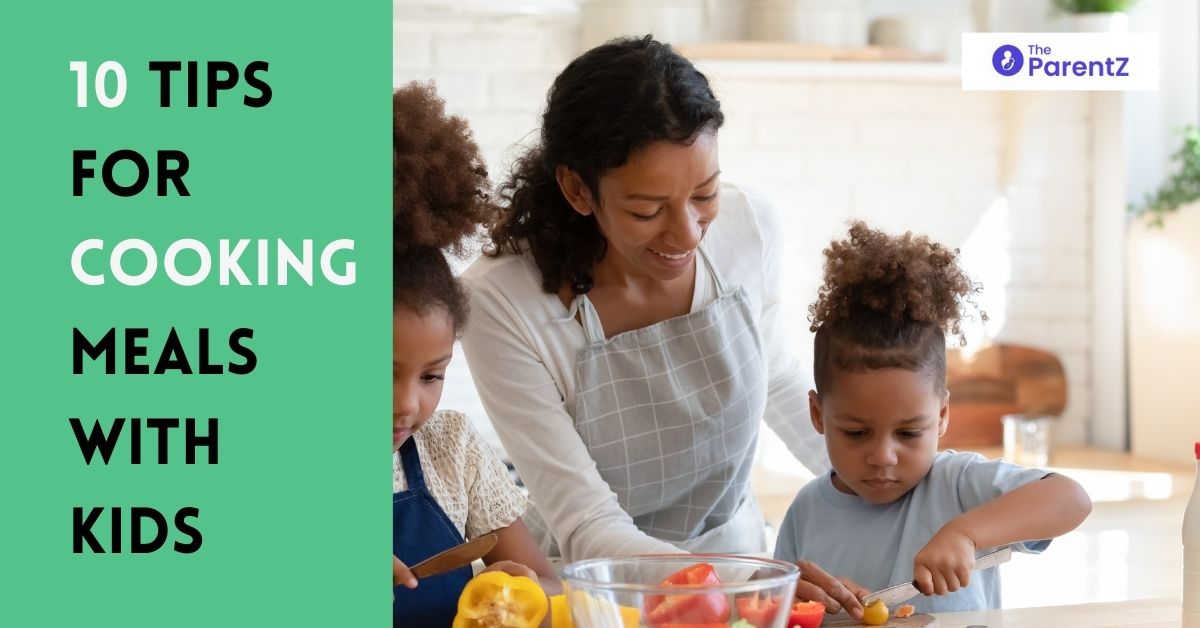As parents, we spend a lot of time in the kitchen. Chances are, because of the Coronavirus pandemic, you are spending more time in the kitchen than you usually would. If you aren’t already cooking with your kids, this is an excellent time to introduce them to the kitchen. And if your kids already spend time with you in the kitchen, why not deepen what they are learning? Check out my previous blog, 5 Benefits of Families Cooking and Eating Together. To build on that blog, the following are ten tips to help you get started cooking meals with your junior chef.
Top 10 Tips for Cooking Meals with Kids
Tip #1 Start Them in the Kitchen Early
Many experts suggest parents can introduce their kids to the kitchen as young as three years old. While that is based on when kids are developmentally able to mix and pour, I believe you can start earlier.
By the time our daughter was four months old, out of necessity, she sat in her bumbo chair on the kitchen counter while I worked in the kitchen (though this is not officially recommended). At this time, both my wife and I worked in Washington DC. Because my job had a flexible schedule, I would go into the office as early as 6:00 AM and pick up our daughter from daycare by 3:00 PM. And my wife would go to work mid-morning, drop our daughter off at daycare, and come home around 7:00 PM. This way, our daughter would only be in daycare for about 6 hours a day.
Because I was responsible for dinner, it was difficult for me to give my daughter the attention she needed while I tried to peel vegetables and boil water. Our apartment had a broad kitchen counter. She was quite stable in her bumbo chair, so she sat up on my level, away from anything dangerous, of course, and we chatted while I cooked dinner. I would sometimes give her a steel bowl with some lemons to keep her occupied. As we moved from that apartment in Washington DC to our current flat in Delhi, our daughter, now almost six years old, has always had a place to sit on the kitchen counter. It is now a family tradition.
While our number one concern is to consider our child’s safety, wherever you are spending time at home, even as young as four months old, consider bringing them with you.
Tip #2 Age Appropriate Tasks
While I didn’t give my daughter any cooking-related tasks at four months old, by the time she was three years old, she was ready to get involved. I love to cook scrambled eggs, so other than learning about her day at pre- school, she would help me scramble the eggs before I added them to the pan. Here are some general guidelines for young kids under 5-years-old and kids around 8-years-old and older.
Kids Under 5 Years Old
- Hand mixing eggs and other ingredients.
- Washing vegetables and fruit.
- Snapping green beans or shelling peas.
- Mash and peel easy items.
- Roll out dough, for chapatis or cookies, and cut with a cookie cutter. (Our daughter loves to make heart-shaped chapatis!)
Kids 8 Years Old and Older
- Cracking and peeling eggs.
- Reading recipe ingredients and instructions.
- Stirring food on the stove (with your supervision)
- Cutting fruits and vegetables with a plastic or dinner knife
- Creating their own recipes!
Of course, every parent must determine the age-appropriate activities in their kitchen. I suggest you go online for more ideas and examples of age-appropriate tasks. Hopefully, this helps you get started.
Tip #3 Set Up Their Own Cooking Space
Our daughter currently has a step stool in a corner of the counter in our kitchen. This is her workspace and where she either stands on the stool to prepare food or sits on the counter to choose the next Taylor Swift song or just chat.
Designing a space for your kids to work helps you manage the mess they will inevitably make. Here are a few items to include in their space to make the process easier:
- Their own set of wash towels close by so they can take the initiative when the spills inevitably occur.
- A set of baking pans with a lip, so if they are measuring and mixing ingredients, the work to contain the spillage is minimized.
- Keep a set of utensils designated for their use in another pan. Instruct your kid to return the utensils after use to the pan. After the meal is prepared, instruct your kid to ensure all of their used utensils are back in the pan. And if your kid is old enough, he or she can wash the used utensils!
Tip #4 Begin with Weekend Meals
Before the pandemic, under normal circumstances, I would suggest you begin cooking at home once a week on the weekend and gradually increase the number of meals as you feel more comfortable. And this is still good advice if you are one of the essential workers who isn’t spending extra time at home.
For those of us working-from-home or stay-at-home parents, we have more flexibility. You might want to start with one meal a week based on what you like to cook. For me, that’s easy. I love breakfast and have perfected how to make scrambled eggs and pancakes. My five-year-old, with adult supervision, can just about pull these off on her own now. My wife prefers baking. Since she’s currently working from home, they’ve made muffins, cookies, bread, and cupcakes together. Start with what you know what to cook. Who knows, maybe the first dish with your kid becomes a new family tradition.
Tip #5 Keep a Recipe Journal
Speaking of family traditions, keep a recipe book to document what you are cooking together. Write down recipes, record dates and meals prepared, write down memories and funny stories while hanging out in the kitchen. Older kids may want to find or create their own recipes. A journal is a great way to document these too.
If you are into Instagram or Facebook, consider memorializing and sharing what you’re making together with family and friends. One of the most important benefits of cooking together is the time spent together.
Tip #6 These are the Rules
The kitchen can be a dangerous place. There are fragile, sharp, and hot items all around us. Establish your rules early and repeat them often. Here are a few of our rules I often repeat:
- We wash our hands before we start
- This is ok to touch, and this is not.
- Only adults can operate the stove or oven.
- These are mom and dad’s knives, and this is your knife (a plastic or dinner knife).
- After cooking, taking her cooking utensils to the sink and wiping down her workspace.
I also suggest if you start a recipe journal, write down the rules, and add or amend the rules when needed.
Tip #7 Let Them Help with Meal Planning, Shopping, and Food Prep
One of the reasons often cited by parents as to why they don’t cook with their children more often is time. It’s a legitimate challenge. Some of the best advice for adults who don’t cook enough at home is to prep food on the weekend. You see where I’m going with this! As you start, prepare a meal together on Saturday, and then on Sunday, prep your meals for the rest of the week together.
As you cook meals together, at some point, ask your kid to pick one or two meals each week they want to eat. Have them work out what ingredients they will need. Have them make a list in their recipe journal and shop with you at the market. As they get older, give them a budget, and set them loose. There may not be any better training for our kids once they are living on their own.
Tip #8 Reading, Math, and Chemistry Lessons
Kids preparing meals in the kitchen can be so much more than mixing ingredients. When making a meal, there are many skills like math, reading, food knowledge, safety, even chemistry, to help keep them occupied and interested. Here are a few tips to help integrate those skills as you work together in the kitchen.
- Safety Skills— A few examples include washing their hands and vegetables, identifying hazardous items like knives and stoves, and carefully wiping down areas where raw meat is prepared.
- Chemistry Skills—The yeast in a rising bread, the microbiology involved in making yogurt, or which ingredients and how they react to each other to create the perfect chocolate chip cookie are all examples of chemistry-related lessons ready to be explored.
- Math—weighing, measuring, and time are used in almost any recipe.
- Food Knowledge—Before you know it, your kid will have an appreciation for how food gets from the farm to your table, knowledge of a wide variety of vegetables, fruit, and spices, and how different ingredients work together.
- Reading—Kids practice reading a recipe and following the directions.
Tip #9 Explore Another Culture Together
Once a month, try to cook a meal that is different from your own culture. This is a great way to explore the world together. This tip might take a bit more planning, but other than gathering the ingredients and learning a technique or two yourself, there’s not much to it. Find resources about the culture, choose a meal to cook together, identify the food’s key ingredients, watch a YouTube video about the culture and/or its food, and, if available, visit a market that specializes in the food. You can make this as simple or as complex as you want. Either way, have fun with it.
Tip #10 Relax
Cooking with kids, especially young kids, can be stressful. So, either have a glass of wine or put it off until tomorrow. Start slow, one meal a week. Know in advance the kitchen will be messier when you’re finished, a dish might break, your kid might quit halfway, and the meal may not exactly come out as planned. And all of that is ok. These are small issues when it comes to spending quality time with our kids while teaching them a worthwhile lesson.
Teaching Our Kids How to Cook and Eat Healthily
One of the most important jobs we have before our little birds leave the nest is to ensure our kids know how to cook and eat healthily. And because we live such busy lives, it is more important than ever that we spend quality time with our kids daily. Everyone has to eat, so preparing meals and eating together is the perfect opportunity to connect and catch up. While eating together daily is simple enough, learning how to include your kid in preparing a meal is a skill as parents, we have to learn. Start with one meal a week and make it on Saturday or Sunday. I promise after four or five weekends, everyone will get the hang of it and will soon become a new family tradition. Share any tips, experiences, or advice in the comment section below you’ve had cooking and sharing meals together with your kids.








Be the first one to comment on this story.